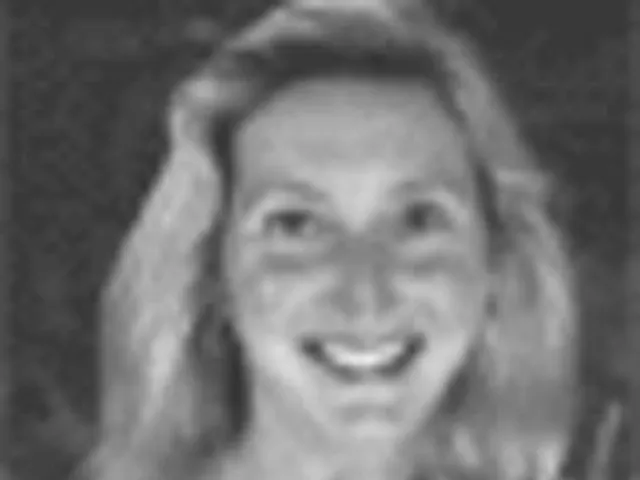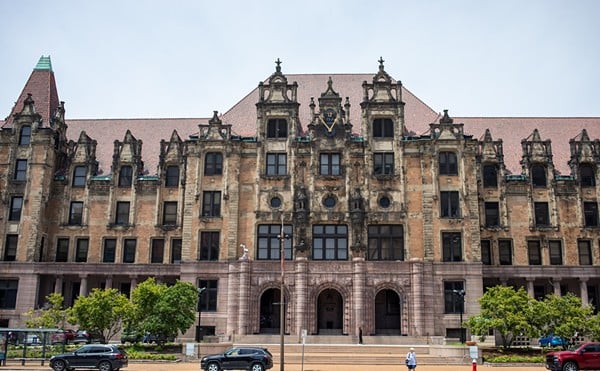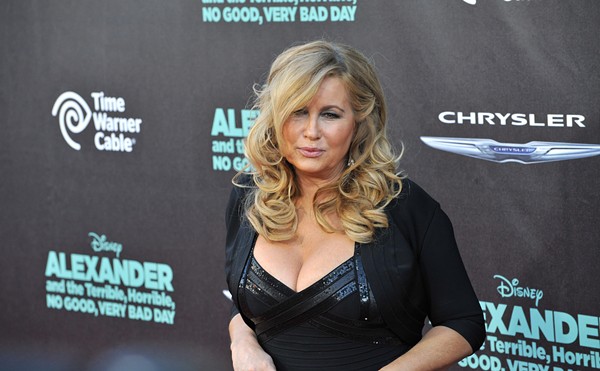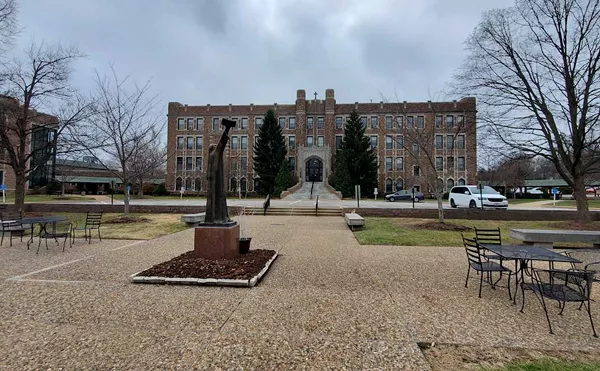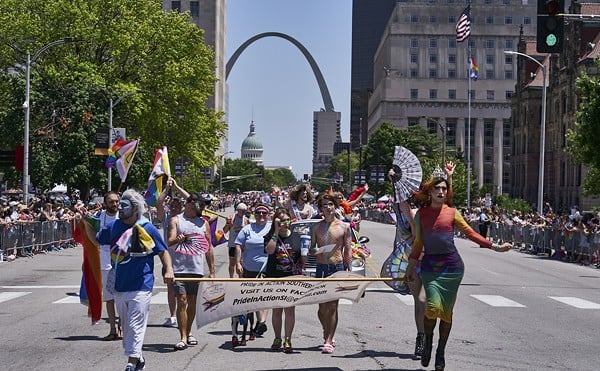"You were treating everyone to beer?" Leibman asks.
"Yes," she apologizes. "I thought it was just him and Sonny."
"Don't worry about it," Leibman reassures her with a pat on the shoulder. Both wear big smiles. The beer tab is their only worry after a Memorial Day afternoon with legendary club leader Ralph "Sonny" Barger, who drew more than 200 people to Left Bank to get signed copies Hell's Angel: The Life and Times of Sonny Barger and the Hell's Angels Motorcycle Club (William Morrow & Co.).
Barger, who limits himself to a couple of Bud Lights this day, is riding across America on Route 66 to promote his autobiography. Like so many outsiders, he's been through but never stopped in St. Louis before. Now, here he is, right in the middle of the Central West End. The cops have made room for the Angels by reserving parking spaces amid the Volvos, Acuras and SUVs that typically line the streets where quiche and microbrews rule. "This is a nice little area," Barger allows as he sips beer from the bottle in front of Duff's. "Looks like a real money area."
Barger doesn't smile much in the photos that grace his as-told-to book, but he's beaming today. And why shouldn't he? It's the first day since he left Chicago that it hasn't rained. When he's thirsty, someone fetches his beer. There are lots of friends among the dozens of bikers and gawkers who've stopped by to say hello.
Rich Stephens, former offensive lineman for the Oakland Raiders, urges Barger to stop by his spread in Jefferson County. He's got 20 acres, plenty of room for shooting, but Barger declines. As a convicted felon, he says, he's not allowed to handle firearms. The pair recall the good old days when the Angels clubhouse in Oakland was a regular stop for Raiders -- including legends Ken Stabler, Ted Hendricks and John Matuszak -- who drank beer from pitchers, lounged in hot tubs and once saw a guest get stomped for overly aggressive slam-dancing. "A couple of boys took him down," Stephens says. "That's all I'll say."
Motorcycles are a mainstay of Stephens' life, so much so that he turned down an offer from the Rams in 1997 so he could attend a course on Harley-Davidson repair. Barger, who owns a custom-motorcycle shop, built one of his bikes. "I think he's a wonderful person," says Stephens. "All the supplements I got from the locker room, I'd bring them to Sonny's and he'd try them out. He'd say, 'This one's pretty good.'"
At 61, Barger bench-presses 285 pounds, but he has every appearance of a man who's retired to the Sun Belt. A lifelong Californian, Barger moved to Arizona two years ago, not far from the federal penitentiary where he served nearly six years for conspiracy to commit murder. He got married last fall for the third time and lives with his wife (who is nearly 30 years younger than him), stepdaughter and three horses on acreage near Phoenix. He hasn't been arrested since the conspiracy beef in 1987, the longest bust-free stretch of his adult life. A former heroin dealer, he now sells salsa, barbecue sauce, keychains and sculptures of himself over the Internet, not to mention T-shirts, hats, tube tops and, of course, leather-bound copies of his book for $125. His chopper days are long gone. He rides a Harley Road King, a massive touring model complete with hard-shell bags and a nice cushy seat. There's a minivan in the entourage, and Barger is staying in motels, a far cry from the days when Angels never carried gear and flopped in roadside fields. He kicked cocaine in prison, he's never been much of a boozer and he smoked his last cigarette on the way to the operating room during a battle with throat cancer in the early 1980s.
Three packs of unfiltered Camels a day and untold amounts of cocaine in the late '60s and early '70s are Barger's only regrets. "The cigarettes gave me cancer, and the cocaine messed up my heart," he says. Surgeons removed his larynx, and so Barger speaks through a hole in his throat that gives his voice a Marlon Brando rasp less from Apocalypse Now than from The Godfather, which is precisely his role within the world's most notorious outlaw biker club, according to law enforcement.
Barger bristles at the suggestion that he's retired. "I bought a new bike two months ago," he says. "I've got 9,000 miles on it already. And I'm as active as I've ever been, if not more." He says his last fight was about three months ago. "Guy was trying to get in the club and I didn't think he belonged in it," he explains. But it's hard to imagine anyone challenging America's biggest badass over whether someone should be in the Hell's Angels, whose members refer to Barger as "Chief."
Even the world's most influential Hell's Angel isn't really free to do as he pleases. If he were, Barger would ride a Japanese motorcycle, or maybe a BMW. He bitches about Harley-Davidsons: Overpriced. Unreliable. Poor performance. Jesse Ventura sold his after Barger was quoted saying it was time to buy a Honda. "We really missed the boat not switching over to the Japanese models when they began building bigger bikes," he writes. "I'll usually say, 'Fuck Harley-Davidson.' Someday, we'll be smart enough to walk away."
"I ride one because I'm a Hell's Angel," Barger says in an interview in Springfield, Ill., the day before his arrival in St. Louis. But, Sonny, you say in your book that Hell's Angels can ride any brand they want. "Yeah, I know, but you gonna tell these guys you're not going to ride a Harley?" Barger growls. A dozen Angels surround him inside a Barnes & Noble while strains of Mozart waft and shoppers sip lattes. "I mean, are you going to show up here on a BMW?" he asks.
Barger, who founded the Oakland chapter in 1957, no longer holds a formal office in the club and often refers to himself simply as a member in good standing. Fritz Clapp, his business manager, who doubles as counsel for the Angels, prefers the term "president emeritus." "Other members, no matter how old they are, no matter how long they've been members, hold him in the highest esteem and regard because they recognize it was his own personal charisma and so on that made the club what it is today," Clapp says. "Anything important, they ask what he thinks about it." The awe spreads well beyond the Angels. "In the biker world, this is the equivalent of a papal tour," adds Clapp. "There are going to be people who literally want to kiss his ring."
In St. Louis, the Angels show up nearly an hour early and run a tight ship. Joby, the de facto head of operations, tells fellow Angels where to place chairs and makes sure there's enough space for Barger's posse. When it's time for Sonny to sign, 10 club members accompany him from Duff's to Left Bank Books. They take over the store, with one Angel posted at the door and the others surrounding Barger, who sits in the children's section. Spectators, including store owner Leibman, are kept at a safe distance -- the only people allowed within 10 feet of Barger are Angels, a bookstore employee and the person for whom he's signing a book.
To be sure, the Hell's Angels are not for everyone. Barger's appearance caused some consternation at Left Bank, which was founded as a bookstore dedicated to nonviolence, human rights and other Aquarian ideals. Barger has been arrested at least 21 times, and not for demonstrating to save the rainforest. In addition to conspiracy to commit murder, he has been convicted of assault with intent to kill, false imprisonment and numerous drug charges, including possession of heroin with intent to sell. In his book, Barger recalls his gun's accidentally discharging during a barroom fight and hitting a man in the head. "The first shot had been an accident, but since the motherfucker was already shot in the head, I bent him over the pool table and shot him again," Barger writes. He also says he pulled a gun on Keith Richards at Altamont when the guitarist threatened to stop playing if the Angels didn't cool it. "He played like a motherfucker," Barger says.
Leibman admits there's no way to reconcile his store's pacifist values with the Angels' reputation for violence, but the decision to invite Barger wasn't his. Store employees vote before inviting any controversial author. Henry Kissinger didn't pass muster last year. Barger, it was decided, is an important cultural icon who deserves the chance to meet his fans. And the book is good, a quick, entertaining read. Greening says employees read passages aloud in the days before Barger's visit. "I was laughing hysterically," she admits.
Leibman confesses he was afraid rival clubs would show up and cause trouble, but he has nothing but praise for the Angels as the party ends. A few walk up and thank him for the beer. "To be truthful, these guys were total gentlemen from the beginning of this event," Leibman says. "Very cordial. Very polite."
As they pull away, Leibman stands on the storefront sidewalk bathed in exhaust fumes, his hands in the air as he applauds.

